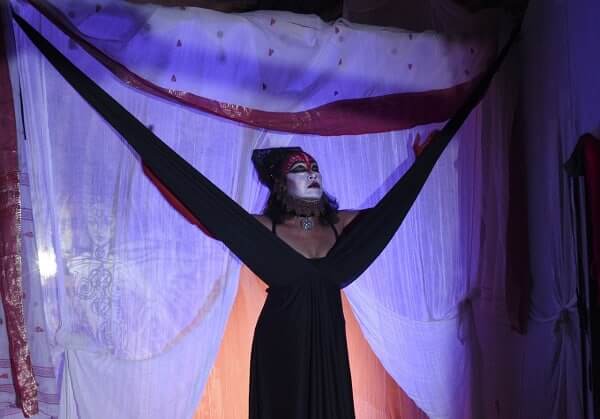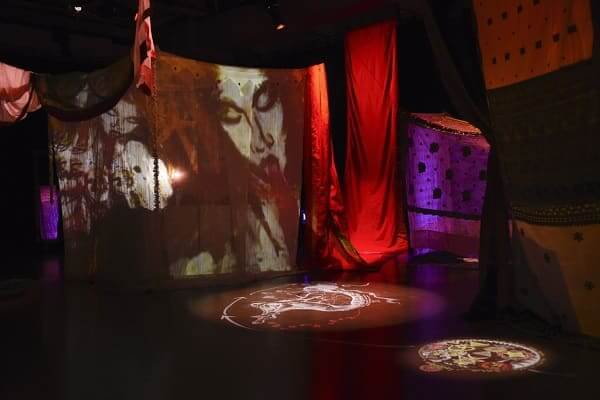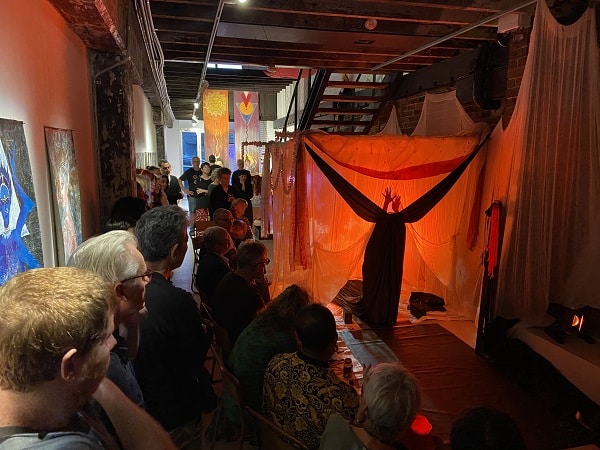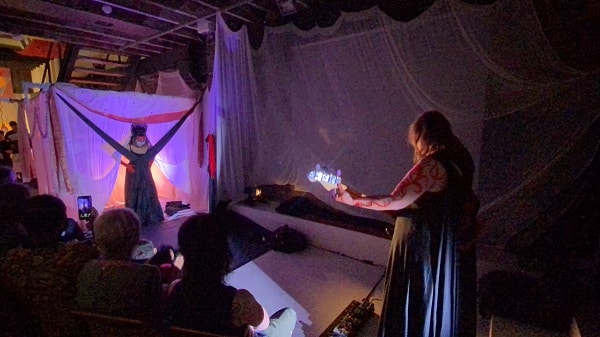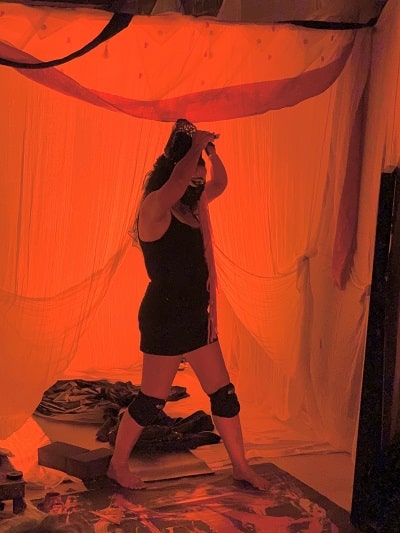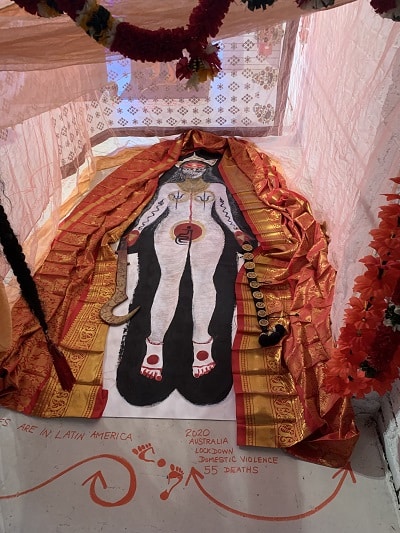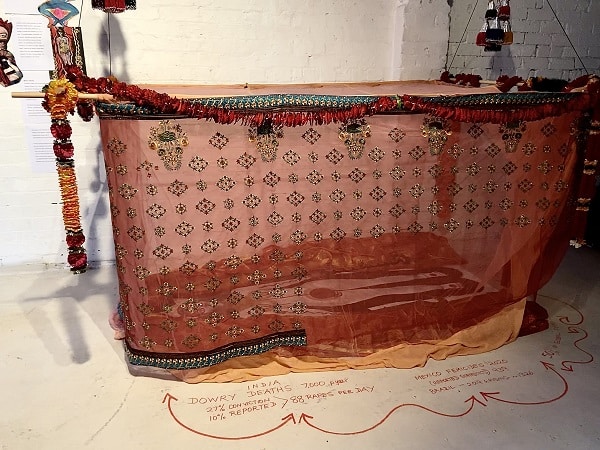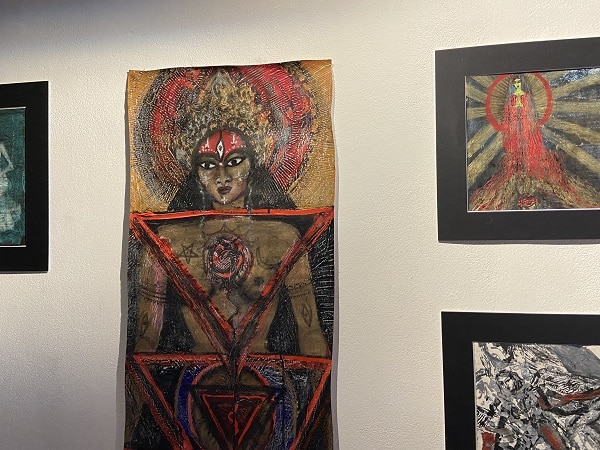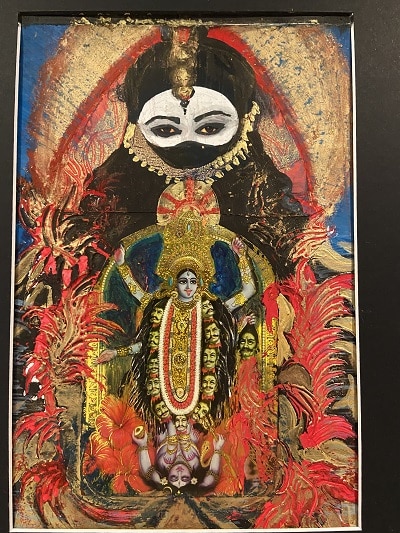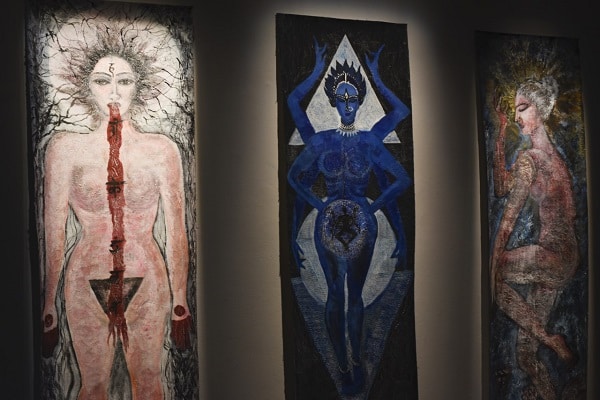Born and raised in Kolkata, Rakini Devi has spent most of her artistic journey engaging with feminist issues, be it dowry deaths in India or rampant femicide in Central and South America.
Her newest Sydney exhibition ‘Inhabiting Erasures’ is inspired by Hindu goddesses, and displays never-before-seen journal paintings, light projections, meaningful performances and deeply informed statistics relating to the oppression of women.
“Besides the ephemeral nature of my art, there is a more sinister aspect of all the research I have done about misogyny and the erasure of women all over the world. The violence against them doesn’t seem to be abating anywhere, it only seems to have intensified,” Rakini Devi told Indian Link. “My drawings are impermanent; they’re just washed away and wiped away during my performances. I create things and then they disappear. It’s the whole concept of erasure.”
Rakini Devi’s performance with sound artist Cat Hope on opening night was a sombre yet empowering depiction of femininity.
She used chalk and paint to write and draw, materials prone to fading, perhaps depicting how society tends to ignore/normalise violence against women.
With Hope’s sunken and reflective guitar strums in the background, Devi creates live art dressed in black flowy fabric with white face paint and amplified makeup, literally embodying goddess-like aesthetics.
The audience witnessed the emergence and rise of a goddess before their very eyes.
READ ALSO: Indian art at Melb’s NGV Triennial 2020-21
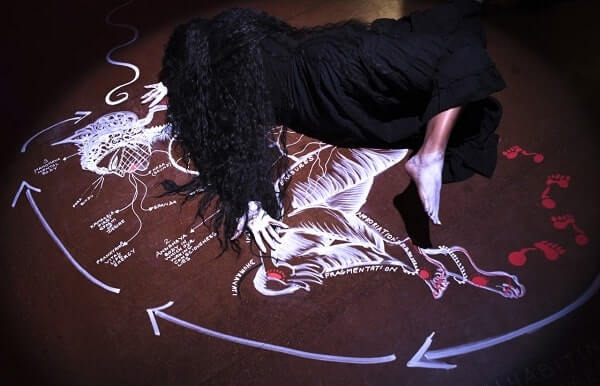
“I suppose 2020 gave me plenty of time to myself at home, just painting a lot. Because lockdown was still ongoing, I found myself alone. I would’ve liked to work with a filmmaker, but my preferred artist couldn’t make it. I was on my own, so I just started playing,” Devi said.
‘Inhabiting Erasures: Embodying Traces Of The Feminine’ was a result of Create NSW’s Quick Response grant Rakini Devi received last year. She used the funding to develop her exhibition idea in the Rex Cramphorn Studio at Sydney University’s Department of Theatre and Performance.
“I had a residency at the Rex Cramphorn Studio where I wanted to try out this blueprint for my exhibition idea. I envisaged it as a multidisciplinary exhibition, where I’d be able to transport, transform, and evolve ideas and present them in different spaces. Not only traditional galleries but challenging environments like huge warehouse-style studios or historic buildings,” she said.
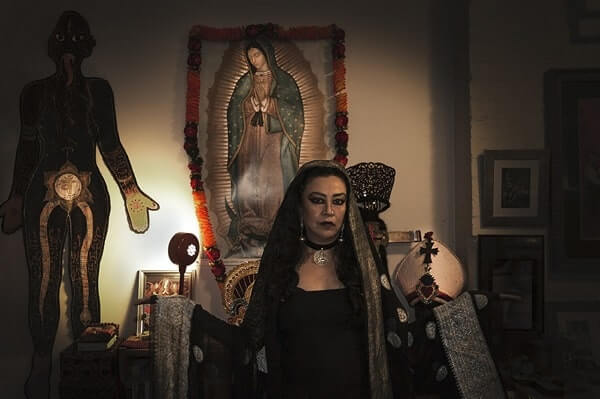
Rakini Devi has roots in the East and the West. She comes from an Anglo-Indian and Burmese background and is trained in Indian classical dance forms Bharatnatyam and Odissi.
The veteran artist has always found herself engaging with religious female iconography, from portrayals of Durga and Kali to integrating pandal-like canopies made from traditional Indian fabrics in her exhibits.
“For years and years, I’ve been fascinated with canopies which remind me of the pandals in India. From a very young age, I used to love going to the Durga pujas and Kali pujas. You would rush to the park and different localities to check out all the pandals. So, the canopy idea kept growing, especially when it came to live art. I wanted to create an environment displaying my own aesthetic and framing myself within these canopies which then I imprinted with my own meanings.”
She added, “In this particular exhibition I’ve used the canopy as an object onto which I’m projecting a lot of incarnations of various performance personas of mine,” Rakini Devi stated.
For her doctorate in Creative Arts from the University of Wollongong in 2017, Rakini produced a thesis titled ‘Urban Kali, From Sacred Dance to Secular Performance’. She described the four years she spent on the doctorate as a period of uncovering “depressing research about statistics of misogyny, female infanticide, dowry deaths, and gendercide.”
Her profound awareness of global atrocities against women across all classes of society, coupled with a passion for religious female iconography, has transformed her into an art activist well-equipped to comment on the issue through a divine lens.
Rakini Devi’s ‘Inhabiting Erasures: Embodying Traces Of The Feminine’ is on at the Articulate project space in Leichhardt until April 11.
READ ALSO: ‘Stories of Kannagi’: a Tamil classic in the Blake Art Prize
Link up with us!
Indian Link News website: Save our website as a bookmark
Indian Link E-Newsletter: Subscribe to our weekly e-newsletter
Indian Link Newspaper: Click here to read our e-paper
Indian Link app: Download our app from Apple’s App Store or Google Play and subscribe to the alerts
Facebook: facebook.com/IndianLinkAustralia
Twitter: @indian_link
Instagram: @indianlink
LinkedIn: linkedin.com/IndianLinkMediaGroup



